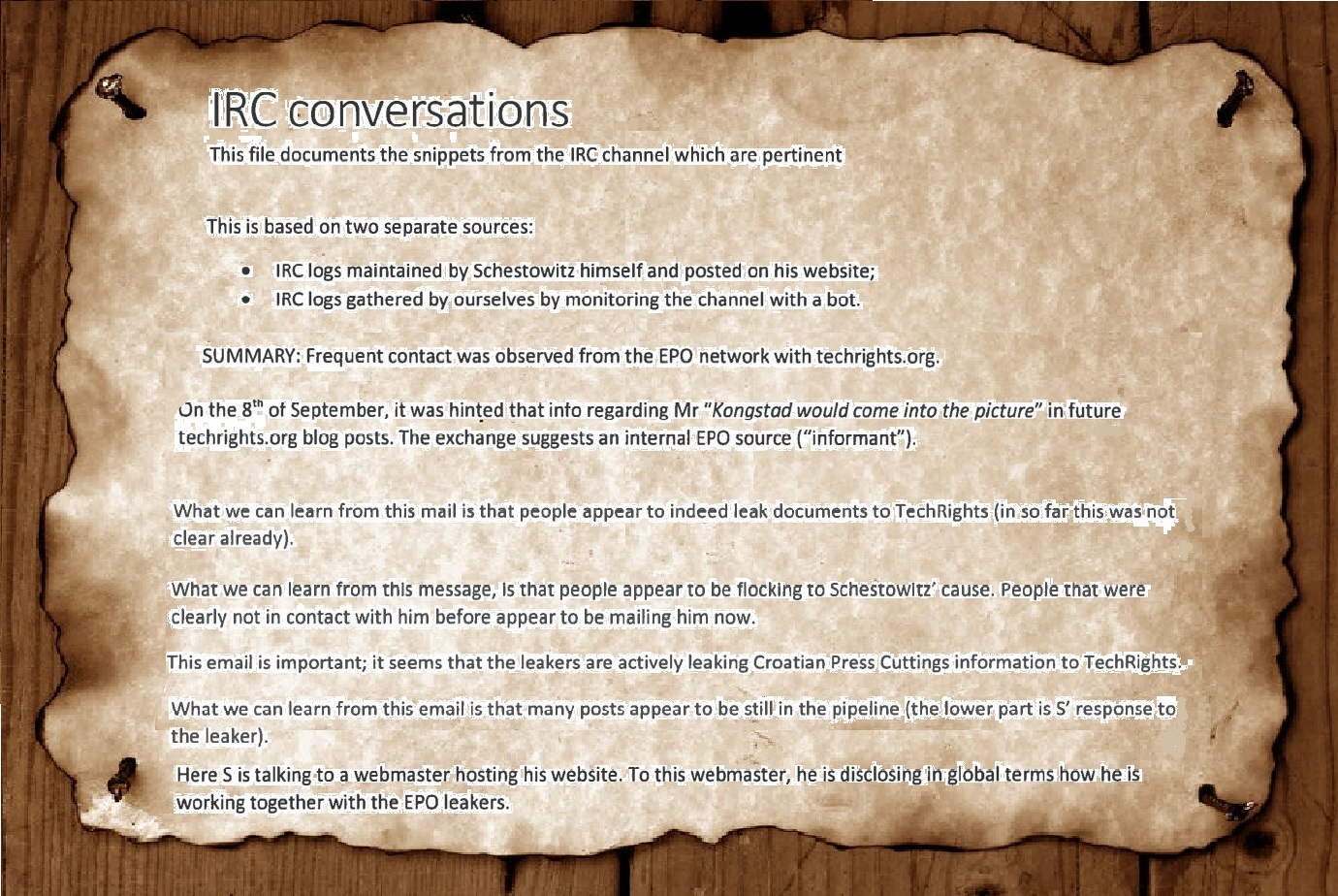

Internal documents show that the EPO's Investigative Unit was active in monitoring "TechRights" and its IRC Channels in the hope of identifying "leakers".
It was the best of times, it was the worst of times, it was the age of wisdom, it was the age of foolishness, it was the epoch of belief, it was the epoch of incredulity, it was the season of Light, it was the season of Darkness, it was the spring of hope, it was the winter of despair…
"In the middle of an ongoing social conflict that had been festering since at least 2012, the suspension of a Board of Appeal member by the EPO President, under the guise of a "house ban", generated enormous disquiet, not only among bloggers, attorneys and EPO staff union officials, but also within the Enlarged Board of Appeal itself."Readers may recall that back in December 2014 the EPO was in a dreadful state of turmoil.
In the middle of an ongoing social conflict that had been festering since at least 2012, the suspension of a Board of Appeal member by the EPO President, under the guise of a "house ban", generated enormous disquiet, not only among bloggers, attorneys and EPO staff union officials, but also within the Enlarged Board of Appeal itself.
As a matter of fact, the members of the Enlarged Board were so incensed by Benoît Battistelli's actions that they sent a letter of complaint to the governing body of the EPO, the Administrative Council.
"Never before had an internal dispute of this kind spilled out into the public domain with such vehemence."As IPKat correctly noted, this was an extraordinary event which was unprecedented in the 40 year history of the EPO. Never before had an internal dispute of this kind spilled out into the public domain with such vehemence.
The letter of 8 December 2014 from the Enlarged Board protested that Battistelli's "house ban" amounted to a suspension which was not lawfully imposed.
According to the Enlarged Board, neither the President nor his Investigative Unit had the required authority to suspend a Board member. It was also noted that the computer belonging to the Board member was confiscated, thereby potentially giving office staff unauthorised access to confidential information about ongoing appeal cases.
"It was also noted that the computer belonging to the Board member was confiscated, thereby potentially giving office staff unauthorised access to confidential information about ongoing appeal cases."The Enlarged Board summarised its concerns in the following terms:
"The actions of the investigation unit on the orders of the President also appear to be a clear challenge to the judicial independence of the Boards of Appeal."
The Administrative Council was urged to take action to bring Mr Battistelli into line:
"What is needed is a clear limitation on the executive power, as far as the Boards of Appeal are concerned, in situations like the present, so as to avoid any impression of undue influence on their judicial work, contrary to the independence requirements of Article 6 of the European Convention on human rights."
Shortly afterwards, the Enlarged Board's letter of protest was endorsed by no less than eight external members from the national judiciaries of the EPO's contracting states.
"The dramatic and unprecedented events of December 2014 were widely covered on various IP news channels."In the midst of this turmoil, some members of the Enlarged Board leaked copies of the letter of 8 December 2014 to IP Kat and Techrights in an attempt to gain publicity for their protest and draw attention to Battistelli's outrageous and unprecedented encroachment on judicial independence at the EPO.
Shortly afterwards - presumably under pressure from "Team Battistelli" - IPKat removed the link on its website to the copy of the letter which it had received
However, the original document can still be viewed online on Techrights.
The leaking of this document was not without risk for the Enlarged Board members involved.
It was subsequently revealed in June 2015 that, at the time in question, the EPO's Investigative Unit had been unlawfully using covert surveillance measures against perceived "internal enemies" of the Battistelli régime.
In fact, it is known that Battistelli's IU invested a significant amount of effort into monitoring "TechRights" and its IRC channels in the hope of gathering information that would assist in identifying the so-called "leakers".
Internal documents indicate that EPO management was in a state of "blue funk" when it realised that "[P]eople appear to be flocking to Schestowitz' cause".
According to the EPO's internal "Stasi": "People that were clearly not in contact with him [i.e. Schestowitz] before appear to be mailing him now."
"As far as the letter itself is concerned, it can be seen that there are 35 signatures appended at the end."As it turns out, none of the Enlarged Board members involved in leaking the letter of 8 December 2014 were ever apprehended by Battistelli and his goons.
As far as the letter itself is concerned, it can be seen that there are 35 signatures appended at the end.
At first glance it might appear that the letter was unanimously approved and signed by all members of the Enlarged Board.
However, the fact of the matter is that two members did not sign the letter.
In the next part we shall consider the potential implications of these "missing signatures" for case no. G 1 /21. ⬆